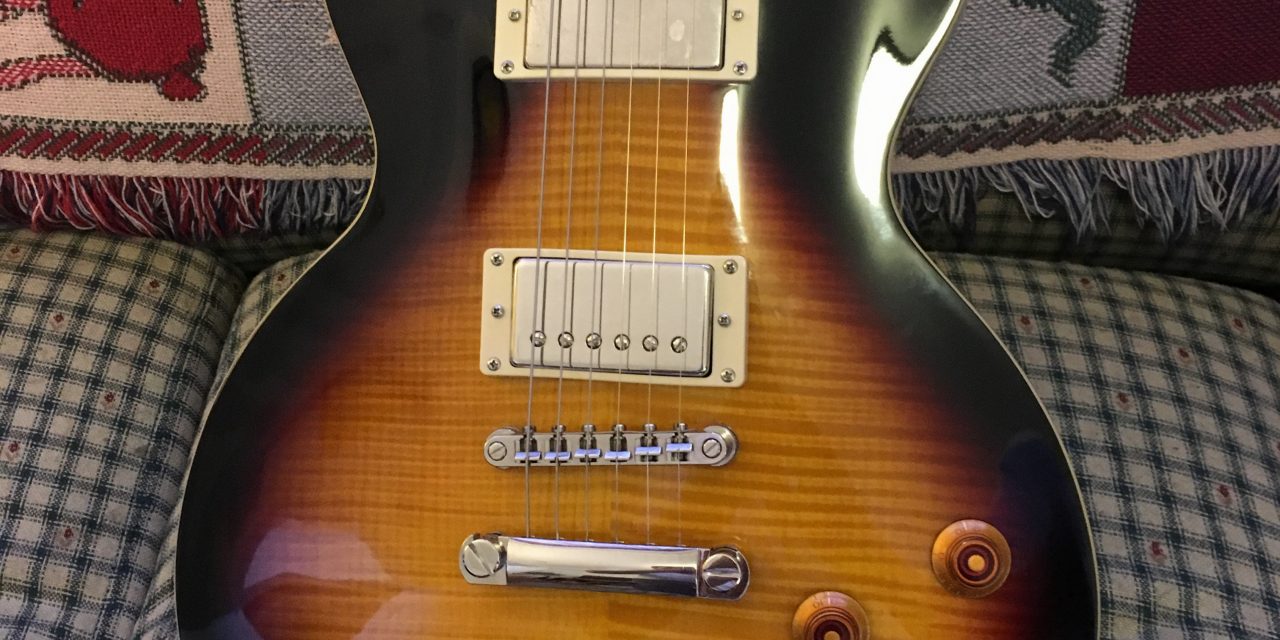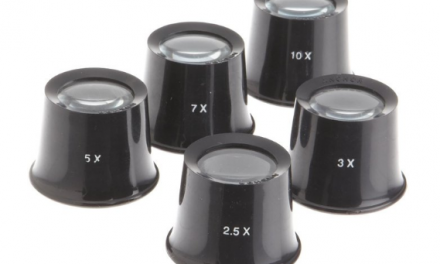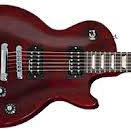Lllllladies and Gentlemen, let’s ready to ruuuuuuumble!
Please, I beg you, forgive me for that awful intro. Sometimes I type what the voices in my head are saying. Usually it turns out to be a bad decision.
Last year I did a refret on my Epiphone Les Paul Standard Plus. I’m having trouble with buzzing on the high E string 5th fret. Other than that it’s playing pretty well. For an Epiphone Les Paul. I’m a big fan of the Gibson Les Paul. I also think they are crazy expensive, so I only buy used low-end Gibsons. For the sake of new readers, the Gibson Tribute line is a great thing. At the risk of boring long time readers who’ve heard this all before, I want to educate the newbies, so…
Gibson couldn’t help but notice that a lot of people were buying guitars in the $500 to $999 range, and they wanted to put some budget Les Pauls into that space. They’d created “tribute” guitars before, but in 2013 they went all out and made tribute Les Pauls and SGs for the 50’s, 60’s, 70’s, and then a model for the “future.” All of these guitars were under $1,000, all made in the USA using Gibson standard parts, and all made on a budget with little frills. Except the dreadful “Futura” model which had the dreadful auto-tuning robot tuning pegs.
But even at $799 or $999, those Gibson Les Pauls were still too expensive for a budget guitarist like me. So I waited, and because they made too many, it took three years for guitar stores to sell them. You can still find new 2013 tributes out there, but a used market has also developed. Thankfully. If you can find one of these guys used, snatch it up, have someone file down the awful sharp fret ends, and you’ll have a fantastic instrument for around $500.
No, dammit, robot tuners are not cool.
So let’s go top to bottom through the Epiphone Les Paul, the Gibson Les Paul 70’s Tribute from 2013 that I own, and a current Gibson Les Paul Traditional which I’ve played a ton (but don’t own.) Or roughly $500, $900, and $2,200. What are the differences?
Neck
All three have necks made out of wood. The Epi uses maple, the two Gibsons use mahogany. Is there a difference in the sound of the type and grade of wood? In my opinion, yes, a small difference. How about tuners? All three use regular Grovers. They are OK. Nut? The Epi nut was plastic, producing an inferior tone to the Gibsons, which use their own custom design that to me is a lot like Tusq. I replaced the nut on my Epi with a Tusq nut, which helped a bit.
But the Gibsons have a singing sustain to them, even unamplified, and the Epi is a bit more like a plunky banjo. Why? A few reasons. Both Gibsons have one piece necks (not counting the “wings” glued onto the sides of the headstock.) The Epi neck is three pieces glued together. Does that impact the sound? I believe it is a factor, yes. All three have rosewood fretboards. Is there a difference in quality? Tough to say, but again, there’s a solidness that the Epi doesn’t have. Fretwire? The fretwire in the Epi seems to have worn down faster, so I’d say it’s a cheaper quality wire. I’ve replaced it with Fender medium-jumbo fretwire, which I like a lot. I think my next step will be to do what PRS does with their guitars – I’m going to flood the area under the Epi frets with super glue, to make sure there’s no space under them, which might help a little.
In terms of the actual fretwork, the Gibsons were done using the Plek machine and they were perfect. Except for spouting on the ends. They developed some sharp ends, which is what kept the 70’s Tribute sitting on the shelf for a month before I bought it – someone would pick it up and play it, and feel the sharp ends, and put it back down. A few minutes work with a StewMac fret end file fixed that. But no such issue on the Epi, which is bound.
Body
Well, the Epiphone and the Traditional both have beautiful bursts, and my Tribute is a stained dark red that is very blah. It loses on looks. Epiphone guitars are unmatched for their looks – they look just as good as the Gibsons for a quarter the price. They look amazing. But they don’t sound amazing. Many people think wood doesn’t matter, but 34 years of playing hundreds of different guitars tells me they’re wrong. The sound of an electric when you play it unamplified does come through to an extent when you plug it in. Part of this is the body. Not just the wood it’s made out of, but how the wood has been treated, how much moisture is still in the wood, how the resins have crystallized. Gibson uses higher quality wood and they have a more expensive process for treating it than Epiphone. It’s one of the reasons they charge more. It’s also one of the reasons the quality of wood is more consistent with Gibson.
So you can easily feel the difference when you play an Epi or a Gibson, assuming you’ve had years of experience playing different guitars. But what about the difference between the Tribute and the Traditional? To my ears and hands, the differences in the wood of the two Gibsons are almost undetectable. I think it’s likely the same wood for the main body. However, the highly figured maple top on the Traditional is far more visually appealing. But that’s cosmetic. And most of the differences between the Tribute and the Traditional are cosmetic. The binding costs money, the fancier knobs cost money, the figured maple top costs money. And the pickups are more expensive.
But clearly the Traditional is not twice as good as the Tribute. With your eyes closed, it’s difficult to tell the difference unless you’re feeling for the neck binding. You’re paying a premium for looks. The Tribute line, much like the Studio line, is a smarter way to spend your money in my opinion. For the cost of a Traditional you could get a Gibson Les Paul Studio and a new American Fender Strat. C’mon, now.
There are other factors. Gibson practices responsible forestry (although they’ve had to be forced to do so) and Epiphone, um, well, they’re made in countries that aren’t as environmentally friendly, let’s just say. Labor costs on Epiphones are cheaper. The bridge and tailpieces on the Epi are cheaper, and that does impact the sound.
Pickups
Epiphone pickups coming out right now are not bad. I didn’t like them at first. But I’ve warmed up a little bit to them. I have the ProBuckers in my Epi 339 and I like them OK. But they’re not as good as the real BurstBuckers in the Traditional. They’re not as good as the Dirty Fingers in my 70’s Tribute. The pickups that came with my Epi originally were crap. Epiphone has advanced. But no, they do not sound as good as anything in any of the Gibsons. Fortunately pickups can be replaced.
This is subjective stuff. I like a certain kind of sound from my humbuckers and I have a bunch of them. And if you really want to know, here’s how my own humbuckers stack up against itself, from best to worst:
- Seymour Duncan Pearly Gates. My favorite pickup.
- Gibson Dirty Fingers
- DiMarzio Super Distortion
- Epiphone Pro Buckers
- Fender Tex-Mex Humbucker
- Seymour Duncan Hot Rails
- GFS Alnico II
- PRS SE Alnico V (from Custom 24 SE)
- Squier “Designed by Duncan” Humbuckers
- Ibanez Ceramic whoknowswhat from lower end Ibanez guitar
The Epiphones aren’t bad. I’d record with them if I had to.
For the record, my favorite rock pickup is actually the Gibson P90. But if I could only choose one pickup I’d pick the Pearly Gates. I have them in two of my guitars for a reason.
Conclusions
If you could buy a used Gibson Les Paul Studio or Tribute for the same price as a new Epiphone, buy the Gibson. However, if you are super, super into the looks of a guitar and not as into playing it, or you maybe bang out a few highly distorted chords and call it a day, the Epiphones are a good deal. I love my new Epiphone LP. They really do look just like the Gibsons. And today’s Epi is far better than yesterday’s. But even in the Epi line you’re going to pay a premium for looks. You can get a black Epi Les Paul for $399 and I think that’s a great guitar for the money, especially if it has ProBuckers. You can pay more for a maple top burst.
But there’s a difference. Do I think the new Gibson Les Paul 50’s Tribute for $899 is a good deal? No. I think it’s a great guitar, but I think it’s not a good deal. However, if you ever see one used down the road for $549, grab it. That’d be a great deal.





